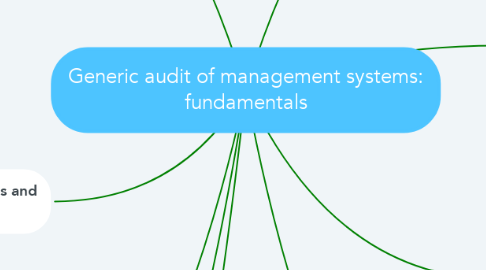Generic audit of management systems: fundamentals
by TATIANA MORENO

1. Approach systems in the audit
1.1. The main objective of a generic audit is to respond to the needs of users for a practical, clear and consistent introduction to the audit of management systems. This can best be achieved by visualizing and presenting all audit decisions and activities directly in relation to the stated objectives.
2. Advantages of the systems approach in the generic audit
2.1. It focuses on the examination of the interdependencies of the elements of the management system within a particular discipline, but also through the quality, environmental, financial and other disciplines. This provides a better understanding of the overall system of the company, and the alignment of underlying management systems towards the goal of the global organization Therefore, a generic audit is conceived as a single system, a set of interdependent, environmental quality, audit processes specific to the financial discipline and another, that the harmonic function and the use of various human, material, information resources and infrastructure, are intended to achieve a common objective of the audit of the organization. Depending on the necessary focus
3. Audit definitions, principles and practices
3.1. Understanding what the audit is and what is not different with the areas and types of application. In the audit of management systems, for example, the ISO 10011 (1990) guide for quality audit specifies that the auditor assesses the suitability and effectiveness of the system implemented by a company
3.2. Beginning Apart from the understanding of the term "audit", in the audit practice of a century, certain basic common features have evolved even when the business environment has changed. We can refer to these common points as `` audit principles '', which is defined in the words of Schandl (1978) as `` a group of guidelines or recommendations to follow in the audit practice if we want a good audit, a correct opinion or judgment. ''
3.3. Practices Perhaps of all the characteristics of the audits of the specific discipline, the most common are the accepted practices of the planning, realization and presentation of reports on the audit. Audit practices, or the audit process, relate to the flow of activities from the conception of an individual audit to the assessment of whether the audit has achieved the objectives set. This is the area that will probably bring the least contention among experts from different audit disciplines (Karapetrovic and Willborn, 1998b).
4. Format and content
4.1. The proposed generic audit directive should increase the current or future audit standards that are more or specific discipline system. This would allow the user of such documents to review the basic principles of the generic audit and the fundamental characteristics of the audit process, including the quality assurance of the audit, before going into the details of, for example, the quality or the audit. environmental. This structure is similar to the current ISO 14010/11/12 series of environmental audit standards. The systems approach, however, must achieve significant improvements for the user and the generic audit profession.
5. Conclusions
5.1. Ongoing audits of management systems must be more consistent, effective and generic in all audit disciplines. The respective standards and audit guidelines should follow the same path. These important objectives can be achieved better if the proposal and explained briefly applies systems approach. Particular, attention should be paid to the sound conceptualization of a generic audit, as well as its principles and practices.
6. Introduction
6.1. Wars of the future will not be waged for land or natural resources, but more so for information and knowledge. Whoever is able to collect and make use of the relevant information from the extreme wealth of available data and intelligence, will win. Even today, knowledge of adequate and pertinent information helps companies win the competition wars. Satisfying customers with the quality of products and services is certainly one area of business that requires timely and reliable information. In order to achieve this objective, a company must know not only what the customers want, but also whether its operations and resources are adequate.
7. Generic audit
7.1. the systems approach Generic audit In the realm of management systems, ``generic'' is the term commonly used to systems or associated frameworks that transcend industry or geographical boundaries. For instance, ISO 9000 and ISO 14000 are generic management system standards that are universally applicable to virtually any organization, regardless of its size, place of business, ownership or market environment. In particular, ISO 9000 standards have been successfully introduced in manufacturing, service and non-profit organizations in over 120 countries
8. Generic Audit Guide
8.1. Two-pronged approach All standards of management systems of the International Organization for Standardization (ISO) are more or less generic with respect to the type of industry or region in which they are applied. This is also true for the associated audit guidelines. The Q1 American National Standard (ANSI / ASQC, 1986) was even called `` generic guidelines for audit quality systems ''. However, audit guidelines have yet to overcome the barriers of disciplined-entrenched, before they become truly generic.
9. General principles for the audit
9.1. 1. The first part would be to list the fundamental principles of generic audit, 2. The second part conceptualizes an audit as a system, illustrates the basic characteristics of the generic audit system model, and discusses the management of the different levels of audits, including generic individual audits, audit programs, and finally , the audit management system. 3. Finally, the third part would deal with assurance of the quality of the generic audits, including the establishment of specific quality assurance systems for audit activities, reliability and ease of maintenance of the generic audits, and, probably, most importantly, the qualifications and competencies of the auditors as the human resources element of the audit system


